- Home
- Stephen Hunter
Soft target rc-1
Soft target rc-1 Read online
Soft target
( Ray Cruz - 1 )
Stephen Hunter
Soft target
Stephen Hunter
2:47 P.M.-3:19 P.M
The bullet hit Santa Claus beneath the left eye.
It shattered his skull, blew a large exit wound from the rear of that vessel, and drove a bright red spatter pattern across the pale satin of his throne like some sort of twisted abstract painting. Worse still, the ballistic energy unleashed an upper-body spasm that shook his hat comically askew, and it slipped off his face and caught on his ear and hung there like a large red sock.
The four-year-old girl sitting in his lap stared not so much in horror but in fascination. She understood that this was “different” but had no larger context against which to compare it. She had no acquaintance yet with the concept of horror and the human fear of seeing the body’s vaults penetrated and eviscerated, but she picked up immediately on the appropriate response from her mother, who grabbed her and started screaming as the hundreds of others clustered around Santa’s throne began to do the same.
A FEW MINUTES EARLIER
It was like combat, except the food wasn’t as good.
It was… shopping… in a mall… on the day after Thanksgiving, the blackest of black Fridays.
Ray Cruz decided that he would never take an IQ test again, for the results, after he had agreed to this adventure, would prove suicidally depressing.
He shook his head, even as someone in the crowd jostled his shoulder. That person was outbound down the corridor called Colorado-after the river, not the state-while he was inbound. His fault? Maybe, maybe not, and courteous as ever, he shot a look to his victim, issued a tiny smile of contrition, noted that it was a she and that she was under twenty and concluded that he did not register as a carbon-based life form, and turned back to what lay ahead.
What lay ahead was people, confusion, greed, stuff, the despair of the holidays, the crunch of families that did not get along, duties and responsibilities only half-articulated but completely felt, guilt and regret, endless and passionate. All that was evident in the tableaux before him, the long corridor of mall America, a place he hardly knew, lined on each side by mercantile units offering the usual treasure-jewelry, clothes, shoes, ladies’ undies, toys, a stop here and there for junk food or hooch-all of it lit through the daylight by the red-green-yellow spectrum of holiday illumination, though the temp was a steady seventy-two and the echoes that amplified the ambient noise level testified also to its indoorness. So much data, so many splendors, a multitude of faces and costumes, the range from beauty to grotesque, from health to sickness, from the very young to the very old. It was like a village bazaar he’d once seen in Afghanistan, except for the Afghanistan part. It sucked the energy out of him. He wanted to take cover. It was incoming, like an artillery barrage to the senses, 24/7. He felt his normally impassive face collapse in unwilled but undeniable melancholy.
“Hey, Marine, don’t fade on me,” Molly Chan said.
“I’m about to call a corpsman,” he said.
“Big tough guy like you? You can get through this. We’ll show up with packages and make them so happy and you’ll feel good. The nephews will all worship you, the sisters will wonder why you took me over them, my father will offer to make you a partner in his business, and my mom… well, who knows about my mom?”
It sounded pretty good to Ray. Family. It was something that had been taken from him years ago, on a highway outside Manila when a drunken truck driver hit his mother and father as they drove home from a visit with her relatives. Even discovering that his biological father still lived hadn’t quite filled the hole in his life; maybe the sprawling, argumentative, rambunctious Chan clan would.
He was forty-two now, a few months past twenty-two years of gung ho, Semper Fi USMC lifestyle, mostly shooting and getting shot at. Ray had many scars from distant, dry or cold places, and he had many memories that sometimes-less now than before-flooded over him: men and boys bleeding out or torn to pieces, the dysentery of fear, the yoke of duty, his own need to press on and finish, even if it finished him. What’re you trying to prove, Ray? Achilles died a million years ago. Someone’s going to put an arrow in your heel too, if you don’t watch out.
I’m Hector, not Achilles, Ray had replied, knowing the difference.
But then, in the Washington area for a talk at one of the alphabet-soup agencies that sought his postretirement employment, he had met Molly Chan, and maybe it would all change, maybe it would be better after all. It had been, of all places, another gigantic mall, one out in Northern Virginia.
“You look like you’re about to cry,” someone had said to him as he stood at the corner of Macy’s and Lord amp; Taylor’s, baffled as to direction and destination.
He turned; she was more Asian than he was, shorter than he was, and unlike his dead flat desert of a face, adept primarily at staying neutral while people tried to kill him, hers was lively, lit from within by intelligence and wit. And she had “You have cheekbones,” he said.
“One on each side. They won’t go away no matter how much I eat.”
“I’m half-Asian,” he said.
“I noticed both halves,” she said. “I bet it’s a long story.”
“Longer than Tolkien. Denser too. But at least-no hobbits. Anyhow, yeah, I am about to cry. Why did I come here? It’s like the end of the world. I just need some underpants.”
“You’ve never been in a mall before?”
“Possibly. I’m not sure. I’m just out of the Marine Corps, twenty-two years. They may get you killed, but they do hand out free underpants.”
She laughed at his little joke, and that was a kind of start. It turned out they got along, their rhythms were right, they agreed on who the world’s assholes were, they didn’t like pompous, overbearing, self-important people, they believed in hard work, modesty, repression, and honesty. Neither drank a lot, both drank a little. Both were embarrassingly smart. What could possibly go wrong?
First it was coffee, then it was a couple of meals, a number of enjoyably merry e-mails, then a really bad movie, and then some interesting stuff happened and here he was in suburban Minnesota, at the biggest mall in America-America, the Mall, it called itself, and everywhere you looked stood the three letters AtM-on the biggest shopping day of the year. He was visiting her parents and family, headquartered in nearby Saint Paul, and on this day, the Chans went shopping en masse.
The family was Hmong, that is, formerly mountain tribal Vietnamese, honorable and ferocious allies of the American war effort of the ’60s and ’70s, since (by political necessity) decamped to the upper Midwest. She was second-generation, had only been to Asia as a tourist. She was thirty-four and an attorney in Washington, at the Department of Energy. She was beautiful, too good for any man she’d ever met, and even now unsure why she had spoken to the trim guy in the mall looking for underpants but glad she had. He remained vague about his past, not knowing that at a certain time, before she got in too deep, Molly had called in a DC favor and had received a synopsis of his career highlights, all five tours in the suck, and the last, crazy ride to hell and glory that ended in that famous missile detonation at the Rose Garden.
“Now,” he said, as they were carried along by the current of the torrential second-floor Colorado corridor, “are we at this spot by random drift or is there a conscious destination ahead?” On either side, stores came and went: Ann Taylor, InvisibleSHIELD by Zagg, LEGO Imagination Center, Impulse, Lee’s Video Gallery. And everywhere lights, green and red, Christmas trees, elves, Santas, the whole nine yards of Christmas cheer braying psychotically at the innocent and the easily disturbed.
“I think there’s a skateboard place up ahead. My nephew George ne
eds tape, it has been explained to me. Thus tape. We get the tape and we are on the homeward bound.”
“I guess I can handle that,” he said.
“You’ll prevail. You always have. Why wouldn’t you now?” she said with a smile.
But the going wasn’t easy, not by any means, and en masse the normally polite and melancholy Minnesotans became somewhat bellicose. Christmas was do-or-die for them, a full-contact sport, played more vigorously than their beloved if sad-boy Minnesota Vikings had played again this season, and two exotics like Ray-Reyes Fidencio Cruz, Filipino by culture if not by birth-and Molly Chan weren’t going to stand in anybody’s way.
They came to Skate City and he followed her in and watched mutely as she purchased a spool of bright red grit tape so that her nephew could whistle around the streets off Central Avenue aboard a mini-surfboard on jet aircraft landing gear. One look at the shaky conveyance, built for speed, guts, stamina, strong legs, and a fourteen-year-old’s lack of capacity to imagine disaster, and Ray faced his own advanced age. He’d been shot at several thousand times but a skateboard scared him to death. He’d rather face a brace of hadjis than something so lethal.
“See, wasn’t that easy?” Molly asked.
“Not bad,” he said. “I feel myself rallying. We are done now, no?”
“We are done now, yes.”
“So we can move on to other things?”
“Unless,” she said, “you want to ride the Wild Mouse.”
“I’d rather do another combat tour than ride that thing,” he said, as, not twenty-five yards away, the corridor called Colorado yielded to an amazing splurge of space under a wash of late-afternoon sunlight, and in the forefront of that space the single car of a roller coaster called the Wild Mouse slalomed by, shaking screams from its teenaged inhabitants. This spectacle was sited just beyond the rail of the balcony, for the mall at that location opened its central space to provide area enough for an amusement park under a vast skylight shaped to resemble a prominent map icon.
The conceit of America, the Mall of Indian Falls, Minnesota, and the stroke of marketing genius, was that it was no simple doughnut-shaped fabrication. Its designers had contrived it to more or less resemble the shape of the continental United States, a stylized pentagon whose morphic resonance would instantly conjure the association to America in the collective unconscious. It was correctly oriented to the compass, moreover, so that a flat, straight border was actually its northern extremity. Then a Washington-Oregon-California coastline angled downward to a San Diego corner before jutting eastward via a long, long wall engineered to form two crescents, which signified the swoops of the Mexican border and the coast of the Gulf of Mexico. At that terminus, roughly where Tallahassee was located in the real world, its outer wall trekked southeasterly to form a peninsular out-crop that stood in for Florida; to complete the fantasy, from the tip of the Sunshine State to the tip of frosty Maine, a wall ran with only one bend, to honor the Atlantic-side convergence of Florida and Georgia. This of course meant that the amusement park was in the “Midwest” or center of the 750,000-square-foot immensity, and above it the skylights were patterned across the vast roof in the configuration of the Great Lakes.
From the ground, the view yielded nothing of interest: no matter from which direction you chose to examine AtM, it looked more or less like an aircraft carrier hull dumped in the middle of the frozen Minnesota plains. That wasn’t the point, however. The whole thing had been located on the primary flight path to the Twin Cities’ great multihub international airport, so thousands saw it in its full glory every day, from 30,000 feet, as it had been imagined by its builders. Like the Pyramids, it only made sense from the sky.
Inside, besides the corridors designated by river names and zones by compass location, it continued with a zealot’s intensity to have fun with geography. Some wit had been allowed: the multiplex movie theater-fifteen screens-was on the fourth floor of “California,” the higher-end, more sophisticated men’s and women’s shops in the NE, in “Manhattan.” “Florida” contained vacationware shops; around the “Midwestern” amusement park had been clustered most of the many, many food stalls, snack bars, and restaurants; and so on and so on.
Most hellish was the amusement park. It sported not only the Wild Mouse but a batch of other thrill rides, one that whirled seats about at the end of tethered wires, another that replicated somebody’s idea of a log waterway that shunted screamers down aquamarine, chlorine-infused liquid, more like Scope than actual H2O. The yells of the riders, the clack of the vehicles on their tracks, the blur of motion, the whoosh of disturbed currents filling the air of the huge place, all amplified under a roof of skylights designed to let in the wan November Minnesota sun and combined with the din of shoppers, made the place pretty much unbearable. It was all there, the two great things that befit a place calling itself America, the Mall: shopping and speed.
“Okay,” she said. “Then let’s get out of here.”
“I am so gone,” he said.
“Oh wait,” she said. “Now, if you really want to make Molly happy, let me point you in the proper direction,” and she twisted him forty-five degrees until he came to bear on a place called Boardwalk Fries.
“I smell potato,” she said. “Potato is good. Potato, grease, salt, crispy exterior.”
“Well,” he said, “I have to say, they smell good.”
“They do, but that’s probably not the actual frying-potato odor but rather some chemical product from Monsanto. It probably comes out of an aerosol can.”
“Well, it worked on me. Let’s get some french fries and-”
That was a sound he knew. One, loud.
Then lots of them. Percussions, sharp and hurtful, flashing back among the corridors and crannies, too loud, earsplittingly loud, replicating themselves in the echo unto multiplicity, and drawing the crowd into silence in a frozen instant before panic, screams, and chaos.
“Somebody’s shooting,” Ray said.
The man who shot Santa Claus was named Maahir; he was an unusually large Somali soldier from the militia Hizbul Islam, under command of General Hassan Dahir Aweys, opposed to the brigands and false believers of the militia al Shbaab. The policy differences between them were immense, and one could list them easily if given a year and a half to do so. The shot was about 150 feet, but for him it was nothing. Maahir had taken many other long shots in his time, making most; he’d also taken many close shots, and the spectacle of death as released upon a body by bullet wound was nothing new to him.
But everything else was new. This place, this strange structure, these people in their comfort, their wealth, their fear, the unbearable smells of food, the beauty of the young girls, the data so overwhelmed him he had almost fallen into enchantment.
But Allah had kept him rigorously devoted to mission.
After the shot, which signaled the beginning of this great martyrdom operation, one that would see him happily arrived in paradise before the day finished, he looked around as people fled him in horror. It was so funny. Ha ha, the look of terror on their faces. In wars, you seldom saw such fear because you were always moving. Not so here.
He stood in the center of the collection of crazed speed apparatuses and listened as the gunshots arose from his brothers, as they engaged the infidels for the first time. Before him panic and fear but mostly collision as some ran this way and some that and many went sprawling in the crack-ups that ensued.
He edged backward a bit, to get out of the rush of the masses, and knew that if he wanted, he could fire and fire and kill and kill, but after all, there was no hurry, and there would be ample time for those pleasures.
On the large video screen displaying the SCADA icons, MEMTAC 6.2 purred away placidly, cybertestimony to the fact that all was tidy in the kingdom of AtM.
You could be forgiven for not looking, but Phil Deakins watched anyway. SCADA stood for Supervisory Control and Data Acquisition, and it was the technology by which the mall was ruled, through
the auspices of its software program, as designed by Siemens, in Germany, called MEMTAC 6.2. SCADA ran access controls, HVAC, energy consumption, life safety, and all other operational aspects of the mall. It “supervised” through the computer and it “acquired” data needed to tell the computers what to do. It could do the simple (unlock doors at a certain time) or the complex (reroute cash register transactions if the satellite processing system went down). It had no preferences, idiosyncrasies, quirks, glitches, charm, or moodiness and represented the dull, systemized perfection of the German engineering mind. You wouldn’t want to go drinking with it; you’d end up barfing beer in a gutter while yearning to invade Poland.
It set the temperature, regulated the lighting, informed security when an alarm went off, controlled the credit card verification process, monitored the fire control system, determined that the cameras and the recording equipment worked at all times. What was so cool about it-those nutsy Germans! — was that its user interface was pictorial and user-intuitive.
Thus what dominated the wall of the security office of America, the Mall, was a glowing representation against an azure blue background of a large flow chart that looked a lot like a family tree from the planet Dune. Chunks of info, identifying labels, holding pens, all arranged by a grid of lines and accessed by an operator with a good mouse hand. The system itself, when it needed petting by humans (rare enough), was controlled by the technique called drag and drop or sometimes “dragon drop,” whereby the operator made things happen via nesting the cursor on something and mousing it to another zone where it was deposited, and somewhere far-off, air-conditioning went down two degrees, the janitors were notified that someone had stuffed cotton underpants in the urinal in the men’s at Hudson 3-122, the log flume chlorine fluoridation program was cranked down by twenty parts per million so that lab smell wasn’t nearly so offensive to older people with oversensitive olfactory glands.

 Point of Impact
Point of Impact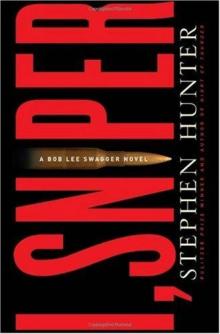 I, Sniper
I, Sniper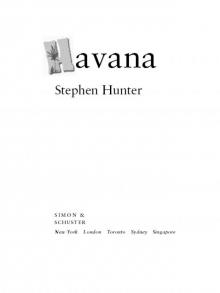 Havana
Havana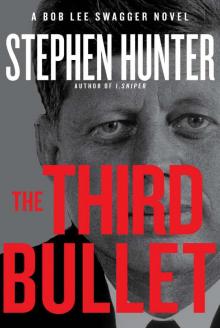 The Third Bullet
The Third Bullet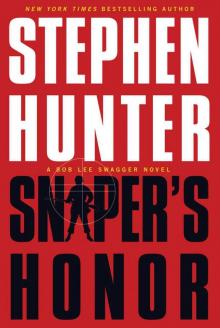 Sniper's Honor: A Bob Lee Swagger Novel
Sniper's Honor: A Bob Lee Swagger Novel Dirty White Boys
Dirty White Boys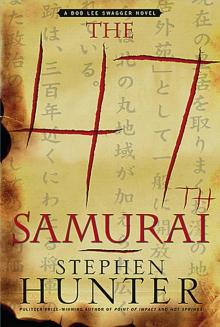 The 47th Samurai
The 47th Samurai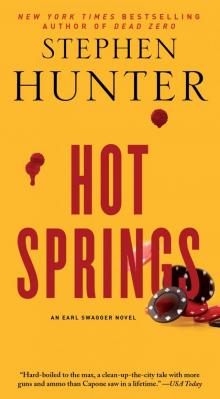 Hot Springs
Hot Springs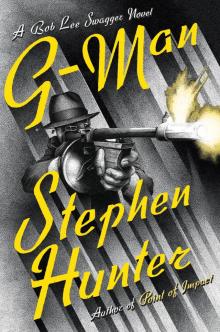 G-Man
G-Man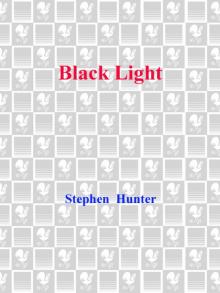 Black Light
Black Light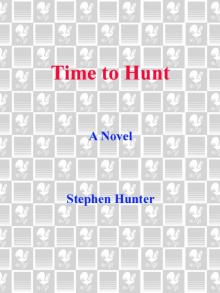 Time to Hunt
Time to Hunt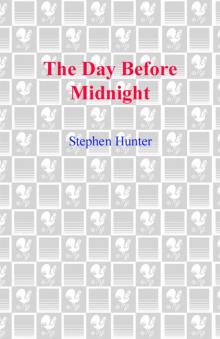 The Day Before Midnight
The Day Before Midnight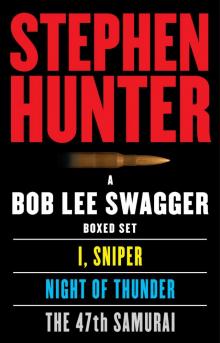 A Bob Lee Swagger Boxed Set
A Bob Lee Swagger Boxed Set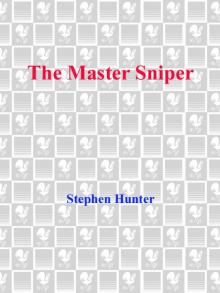 The Master Sniper
The Master Sniper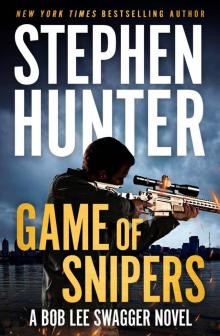 Game of Snipers
Game of Snipers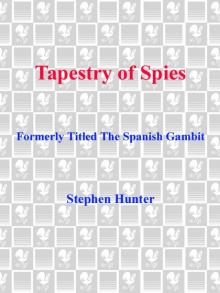 Tapestry of Spies
Tapestry of Spies Citadel
Citadel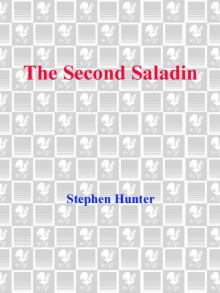 The Second Saladin
The Second Saladin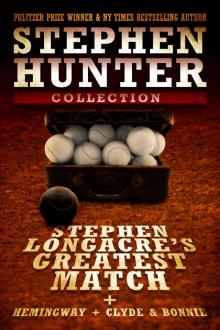 Stephen Longacre's Greatest Match
Stephen Longacre's Greatest Match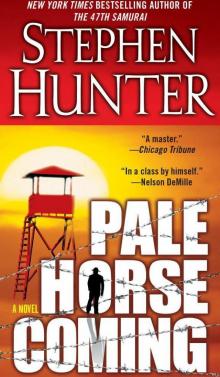 Pale Horse Coming
Pale Horse Coming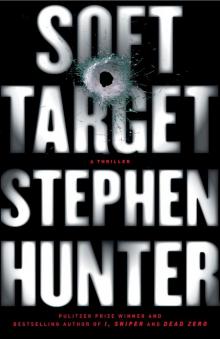 Soft Target
Soft Target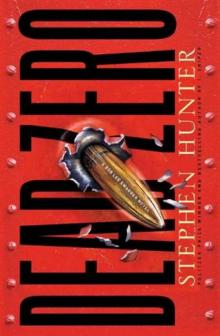 Dead Zero
Dead Zero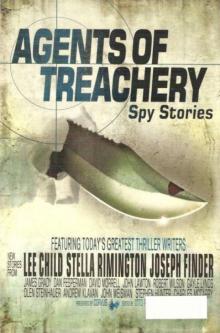 Casey at the Bat
Casey at the Bat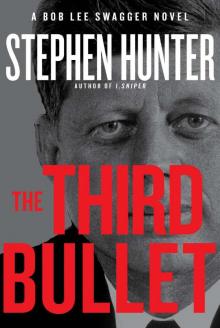 The Third Bullet bls-8
The Third Bullet bls-8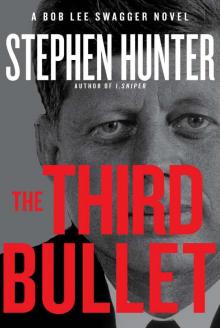 The Third Bullet: A Bob Lee Swagger Novel
The Third Bullet: A Bob Lee Swagger Novel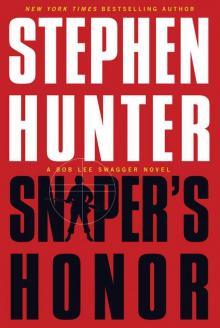 Sniper's Honor
Sniper's Honor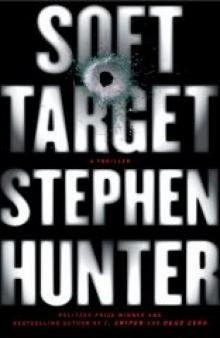 Soft target rc-1
Soft target rc-1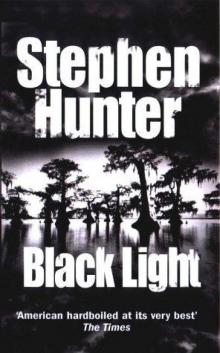 Black Light bls-2
Black Light bls-2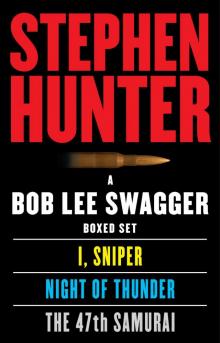 A Bob Lee Swagger eBook Boxed Set: I, Sniper, Night of Thunder, 47th Samurai
A Bob Lee Swagger eBook Boxed Set: I, Sniper, Night of Thunder, 47th Samurai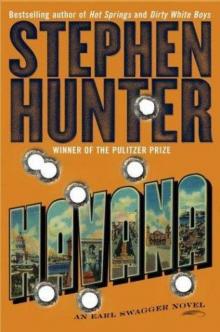 Havana es-3
Havana es-3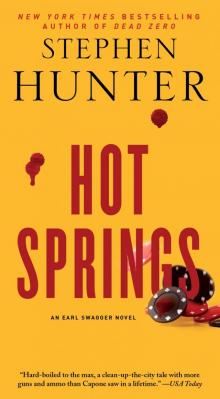 Hot Springs (Earl Swagger)
Hot Springs (Earl Swagger)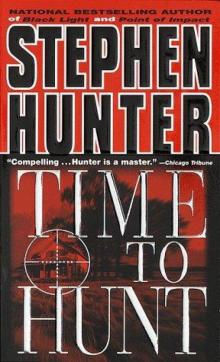 Time to Hunt bls-1
Time to Hunt bls-1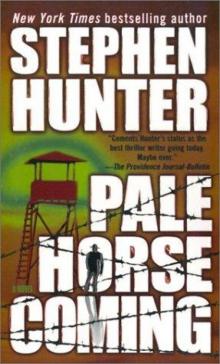 Pale Horse Coming es-2
Pale Horse Coming es-2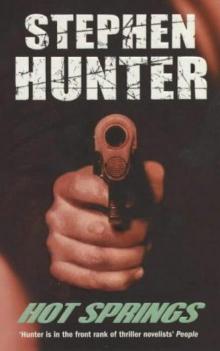 Hot Springs es-1
Hot Springs es-1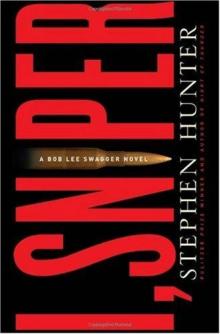 I, Sniper: A Bob Lee Swagger Novel
I, Sniper: A Bob Lee Swagger Novel